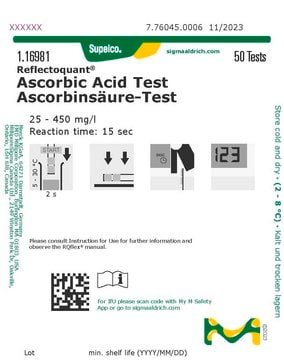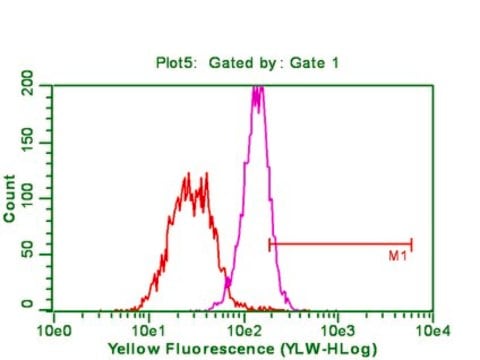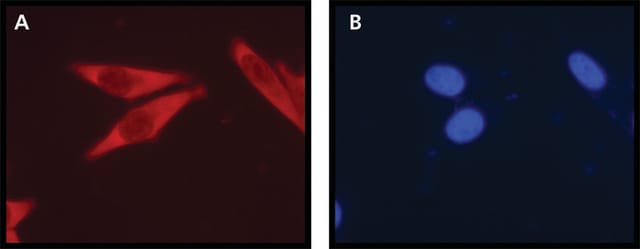MAK075
Ascorbic Acid Assay Kit II
sufficient for 100 colorimetric tests
Synonym(s):
FRASC Assay, Ferric Reducing/Antioxidant and Ascorbic Acid
Sign Into View Organizational & Contract Pricing
All Photos(2)
About This Item
UNSPSC Code:
12161503
NACRES:
NA.84
Recommended Products
usage
sufficient for 100 colorimetric tests
detection method
colorimetric
storage temp.
−20°C
General description
The new Ascorbic Acid Assay Kit, MAK505, is now available! Ascorbic Acid, also known as Vitamin C, is a six-carbon lactone produced by plants and some animal species but not by humans and other primates. Ascorbic acid functions as an enzymatic cofactor for multiple enzymes, serving as an electron donor for monooxygenases and dioxygenases. Ascorbic acid also functions as a powerful antioxidant, particularly in regards to reactive oxygen species.
Application
Ascorbic Acid Assay Kit II has been used to determine ascorbic acid concentration in vitreous sample from the eye.
Suitability
Suitable for use with cell and tissue culture supernatants as well as serum, plasma, urine, and other biological fluids.
Principle
In this assay, ascorbic acid concentration is determined using the Ferric Reducing/Antioxidant and Ascorbic Acid (FRASC) assay. Fe3+ is reduced to Fe2+ by antioxidants present in the sample, which results in a colorimetric (593 nm) product. The addition of ascorbate oxidase to parallel samples oxidizes any ascorbic acid present allowing for the measurement of the ascorbic acid concentration.
replaced by
Product No.
Description
Pricing
Storage Class Code
10 - Combustible liquids
Certificates of Analysis (COA)
Search for Certificates of Analysis (COA) by entering the products Lot/Batch Number. Lot and Batch Numbers can be found on a product’s label following the words ‘Lot’ or ‘Batch’.
Already Own This Product?
Find documentation for the products that you have recently purchased in the Document Library.
Customers Also Viewed
Karthik Murali et al.
PloS one, 11(3), e0149961-e0149961 (2016-03-02)
We investigated the spatial variation of vitreous oxygen consumption in enucleated porcine eyes. A custom made oxygen source was fabricated that could be localized to either the mid or posterior vitreous cavity and steady state vitreous oxygen tension was measured
Li-Zhen Zheng et al.
Biomaterials, 238, 119828-119828 (2020-02-12)
Magnesium (Mg)-based biometal attracts clinical applications due to its biodegradability and beneficial biological effects on tissue regeneration, especially in orthopaedics, yet the underlying anabolic mechanisms in relevant clinical disorders are lacking. The present study investigated the effect of magnesium (Mg)
Katarzyna Jezierska-Wozniak et al.
Journal of clinical medicine, 9(3) (2020-03-07)
Neurological disorders, including minimally conscious state (MCS), may be associated with the presence of high concentrations of reactive oxygen species within the central nervous system. Regarding the documented role of mesenchymal stem cells (MSCs) in oxidative stress neutralization, the aim
Our team of scientists has experience in all areas of research including Life Science, Material Science, Chemical Synthesis, Chromatography, Analytical and many others.
Contact Technical Service






